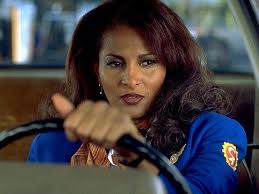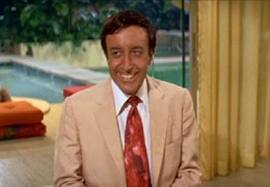My teenage son Jack is a major film and video afficionado, and so going away on holiday with him usually involves a fair bit of viewing. But this time, with no TV, rainy weather, and a holiday place that turned out to be stacked to the gills with videos, he got through a lot of viewing, much of which I got involved with too, to some degree or other.
Thus I caught a lot of films I had missed over the years, and re-viewed others that I’d liked. Most of them were chosen by my son, so I didn’t get to re-view La Reine Margot, Delicatessen, Cinema Paradiso and a number of other old favourites of mine he simply couldn’t be persuaded to insert into the machine. And there were some, such as Blue Velvet, that I viewed without him.
In David Lynch’s smalltown masterpiece, Kyle MacLachlan plays Geoffrey, a teenager who finds a severed human ear amid rubbish scattered on a vacant lot near his home. Soon he is drawn into a world of horrifying cruelty and brutality that lies just a scratch beneath the surface of his whitebread American town, in which a club singer (Isabella Rossellini) is being sexually tortured at will by a psychotic hoodlum Frank (Dennis Hopper), who has her son and husband kept hostage. Hopper is as superbly chilling as Rossellini is vulnerable. Lynch’s storytelling is well paced and seamless, all the threads drawn together for a terrific climax and a suitably cheesy denouement. Memorable moments include Geoffrey’s anguished question “Why are there people like Frank?”, Laura Dern’s figure 8 cry of anguish, and Dean Stockwell's campy frill-shirted weirdo, miming Roy Orbison’s “In Dreams” on a microphone with a little light inside it, illuminating his every powdered facial crease.
One I had missed until now. Initially it appears a la Lolita, but the story detangles into strands that are luminous, compelling and affecting. Kevin Spacey puts in a beautifully layered performance as Lester Burnham, an everyman painted into a corner by life, without love, without sex, without any real joy. His newly ignited desire for the sexy young friend of his teenage daughter unsettles the world around him, including his uptight wife (Annette Bening, in an equally memorable performance), and, tragically for him, his virulently homophobic closet gay neighbour, who mistakes his sense of liberation for something else entirely.
The disciples of Joseph Campbell have a lot to answer for in modern cinema. While Campbell's work on the "hero's journey" may be useful as an interpretative tool applied to myth and legend, when it falls into the hands of amateurs (and even worse, auteurs) it can smack of the storytelling equivalent of Arthurian painting by numbers. I remember seeing Star Wars at release in the 1970s - roped in, yes, by all the hoopla - and the feeling that I was perhaps almost the only person in the crowded cinema who found it as tedious and predictable as Disney. Both Lucas and Disney endlessly trumpet the triumph of the individual and the pursuit of dreams, and, in framing the individual at the centre of all things, sprinkle just that much more bullshit fertiliser onto that ever-cosseted parasitic vine, the American Dream. Luke Skywalker’s “hero’s journey”is from callow youth, through his “mentor” to the moment of personal shit when all seems lost, to the ultimate triumph through“The Force” (see: Religious Faith). It’s a fast-paced action adventure shoot-em-down, with stock standard antagonist-attraction love interest (Princess Leia/Carrie Fisher with Han Solo/Harrison Ford) and legendary overtones of good (Obi-Wan in white) and evil (Veder in black), with some good visuals, Wagnerian soundtrack and great sound: it's Prince Valiant as space opera, Flash Gordon with a budget. But those who claim this is some kind of modern myth-making might reflect that real myths grow over millennia, from telling to telling, and are not created by film companies for profit. Myths are the repositories of the experience and wisdom of human communities through history, rather than the brainchild of some superman cine-individual. Viewing this film again, provides evidence that society is indeed “dumbing down”: people loved this stuff 35 years ago .
Pilloried as borrowing heavily from Star Wars, John Travolta’s Battlefield is a standard sci-fi pic that is nowhere near as bad as the crits it got. It’s not one of the worst films ever made - there is a long list of candidates far more deserving of that title. Those concerned that this big budget rendering of a novel by Scientology founder L. Ron Hubbard is propaganda for his religion (unparenthesised as it is no more or less absurd in its liturgy and beliefs than any other) need not bother themselves. It gets knotted and tangled up in all its own hairy threads and is too complicated and ultimately nonsensical for anyone to extract any “message” from it, though the final image of the caged villain in a vault of the gold bars he murdered so many to get, is nice. Largely innofensive matinee fare, with Travolta as the villain with double cheese.
Another sci-fi pic, this one from a novel by Robert Heinlein, about Earth battling distant worlds inhabited by big nasty insects. There are lots of the de rigueur plastic model spaceships with all the little lights in them, and big blasting sound. There is some attempted characterisation by the cast, but any try at real story is thwarted by the unanswered question of why didn’t Earth just use napalm amd nuclear weapons against the bugs? Or, failing that, bug powder?
This open-throttle assault on the sensibilities of the dormitory class retains its power to confront. A smack-happy holiday in a Scottish hell, it doesn’t relax its grip from the police chase at the top to the doublecross at the end. Mark Renton (Ewan McGregor) is a deadshit charmer who beds the schoolgirl, practical jokes the best friend to death, and betrays all those who trust him most, junkie to the end.
One Flew Over the Cuckoo’s Nest **** 1/2
I missed this screen version of the Kean Keasey novel at the cinema, and somehow had not seen it until now. Jack Nicholson plays a misfit who cons his way off a prison work detail and into a psychiatric unit, where he expects the going to be easier. While it is at first, his growing affection for and loyalty to his fellow patients precipitates a slow motion act of self betrayal and self destruction by a sane man in a world that cannot recognise its own madness, and treats him with unspeakable, callous brutality in the guise of medical treatment. Nicholson is riveting, the film unfolds with a measured pace that allows the truth to dawn (outlawed now in screenwriting) and it never preaches. I was reminded of another cinema classic, Cool Hand Luke.
Holds up (sic) with time. Quentin Tarantino's cut-up, multi-perspective narrative is as cleverly engaging as ever, and the cast members, headed by Samuel L. Jackson and John Travolta, put in almost uniformly fine performances. A homage to Hitchcock and the French New Wave, and criticised at release on the grounds of racist stereotyping and consciously contriving ultra-violence as cool, it has nonetheless attained the deserved status of a bone fide classic. The musical choices are of course impeccable.
Tarantino’s follow-up again explores the seedy lives of the LA criminal underclass, who seem to spend much of their time in vicious activities such as watching daytime television and smoking bongs. It has fewer (and less graphic) shooting murders than Pulp Fiction - only four this time, by my body count. Tarantino centres this tale of small mean lives on the eponymous Jackie, an airline stewardess in a major pickle. Though disappointing some critics with its more conventional storytelling than Pulp Fiction, it has a satisfyingly complex story and a well drawn central character. Pam Grier as Jackie coolly plays off all sides, pulling all the strings for the film’s shoot-out climax. This, alas, is a tad unbelievable, as Samuel L. Jackson’s gang war seasoned Ordell Robbie, holding a human shield at gunpoint, chooses to walk first into a darkened room where an armed woman he doesn’t trust - Jackie - awaits him... and is duly gunned down by the cops.
An enchanting minor classic, about what happens when a teenage brother and sister are magically transported from the here and now into a vintage black and white TV show Pleasantville that the brother (Tobey Maguire) loves. The presence of the real world teenagers in Pleasantville starts a chain reaction that gradually eats away at the traditional 50s American values of the bland TV series and its unidimensional characters, introducing such perils as sex, art and literature. The film is distinguished by the radiant presence of Joan Allen, who plays the teenagers’ mother in Pleasantville. In a touching and ironic scene, she learns the facts of life from her own children, leading to her exploration of her erotic self, at the climax of which she flushes into full colour, and a tree bursts into flame in the picture perfect, white picket fenced garden. As the 50s facade crumbles, and more of the black and white characters come to experience genuine emotion and take on colour, the town fathers organise as vigilantes, and violence erupts. There are ironic overtones to fascism in the book burnings and the banning of art and music deemed “decadent”, and to segregation, with shops putting “No Coloureds”signs in their windows. A high concept that works, by writer/producer/director Gary Ross.
A mad scientist (Glenn Close) turned estate agent (well, we always knew that, didn’t we) creates a closed community in Connecticut where wives are medically “made over” to idealised visions of 50s American women, as brainlessly pretty, sexually compliant, obedient Betty Drapers without the shotgun. Each husband has his wife’s own personal remote control, with her name written on it in copperplate script. Close, Nicole Kidman, Matthew Broderick, Bette Midler, Christopher Walken all try their darndest with this high concept that does not work. Credibility disappears down its tractor-sized story holes, leaving little but a vapid commentary on the battle of the sexes.
Poo-bum meets fart joke in this piss-take of “moral” America. A satire in incomprehensible voices to nasty show tunes for the goldfish generation.
Mike Meyers’ spoof on James Bond grew from this wobbly beginning into that terminal Hollywood condition, the franchise. There’s no doubt about Meyers’ talent - he wrote the script as well as starred - but the joke is thoroughly milked from early on in this very first one. The films that followed were better and enjoyed more success, but in the end it was all just more of same.
This classic comedy is hilarious from the opening sequence, a slice of 60s America glimpsed through the eyes of a hapless yet essentially decent and nice Indian actor (Peter Sellers). Blake Edwards oversaw a film which retains its comedic power no matter how many times it’s seen, and hasn’t dated. Along with Doctor Strangelove, it is perhaps Sellers’ finest work for the screen.
The Unbearable Lightness of Being *** 1/2
Daniel Day Lewis and Juliette Binoche feature in this 80s adaptation of Kundera's novel, set against the Czech "Prague Spring" of 1968, a peaceful uprising against Soviet rule brutally smashed by tanks and troops. Lewis plays a young doctor highly attractive to women, and equipped with the signature line "take off your clothes". Nowadays he would be labelled a "sex addict", that ugly notion that seeks to create a medical problem out of human sexual attraction, and the latest upwelling of American Puritan sentiment. He gets involved in a love triangle with his innocent and vulnerable wife (Binoche) and a freethinking liberatarian artist, and the film finely balances the struggle for liberty against tconstraints of authority on the individual and mass level, in a young man's pursuit of happily married monogamous love amid a smorgasbord of earthly delights.

















